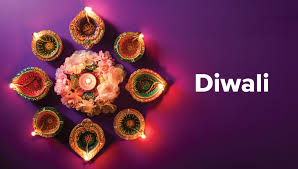Diwali, also known as Deepavali, is one of the most significant and widely celebrated festivals in India and among Hindu communities worldwide. It usually takes place in October or November, depending on the lunar calendar.
### **Celebration of Diwali:**
1. **Five Days of Festivities:**
– **Dhanteras:** The festival begins with Dhanteras, dedicated to the worship of Lord Dhanvantari, the god of health, and Goddess Lakshmi, the goddess of wealth. People clean and decorate their homes and purchase new items, particularly precious metals, as a sign of prosperity.
– **Naraka Chaturdashi (Choti Diwali):** This day is marked by the triumph of Lord Krishna over the demon Narakasura. It’s a day for cleaning and preparing homes, and people often light lamps and burst crackers.
– **Diwali (Main Festival Day):** The third day is the main Diwali day, celebrating the return of Lord Rama to Ayodhya after defeating the demon king Ravana, as described in the Ramayana. People light oil lamps (diyas), decorate their homes with rangoli (colorful patterns), exchange sweets, and burst fireworks.
– **Govardhan Puja:** The fourth day commemorates Lord Krishna’s lifting of the Govardhan Hill to protect the villagers from a storm. This day involves preparing special dishes and offering them to Krishna.
– **Bhai Dooj:** The final day celebrates the bond between brothers and sisters. Sisters perform a ritual for their brothers’ well-being, and brothers give gifts in return.
2. **Customs and Traditions:**
– **Lighting Diyas and Candles:** Homes and public spaces are adorned with oil lamps and candles to symbolize the victory of light over darkness.
– **Fireworks and Sparklers:** Bursting fireworks is a common tradition during Diwali, representing the joy of the festival and the celebration of light.
– **Rangoli:** Colorful patterns made from colored powders, flowers, and rice are created at the entrance of homes to welcome guests and bring good fortune.
– **Gifts and Sweets:** Exchanging gifts and sweets is a significant part of the celebrations, reflecting the spirit of sharing and goodwill.
### **Importance of Diwali:**
1. **Symbol of Light Over Darkness:** Diwali signifies the triumph of light over darkness and good over evil. The lighting of lamps symbolizes the victory of knowledge over ignorance and the dispelling of darkness.
2. **Spiritual Significance:** For Hindus, Diwali is deeply connected to the stories of various deities, including Lord Rama, Goddess Lakshmi, and Lord Krishna. It is a time for spiritual reflection, prayer, and seeking blessings for prosperity, health, and happiness.
3. **Cultural Significance:** Diwali is a time for family gatherings, renewing relationships, and celebrating cultural heritage. The festival strengthens social bonds and fosters a sense of community and belonging.
4. **Economic Impact:** The festival also has an economic impact, with significant spending on decorations, gifts, new clothes, and sweets. This boosts local economies and businesses, particularly those involved in the production and sale of festive goods.
Diwali is not only a time of joy and celebration but also an opportunity for introspection, renewal, and the strengthening of familial and social bonds.





